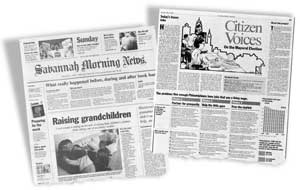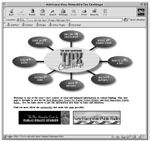Summer 2000
Savannah, Philadelphia, New Hampshire
Share Batten Award for News, Editorial, Online Initiatives
 The Savannah Morning News split this year’s James K. Batten Award for Excellence in Civic Journalism with a Philadelphia election project and a New Hampshire interactive tax series in a competition that showcased the striking range of civic journalism evolving around the country.
The Savannah Morning News split this year’s James K. Batten Award for Excellence in Civic Journalism with a Philadelphia election project and a New Hampshire interactive tax series in a competition that showcased the striking range of civic journalism evolving around the country.
“The winners – the Savannah Morning News for ‘Aging Matters,’ The Philadelphia Inquirer for ‘Citizen Voices ’99’ and New Hampshire Public Radio’s ‘Tax Challenge’ and online tax calculator – demonstrated civic journalism’s impressive ingenuity in engaging citizens. The winning journalism was produced in four different news cultures – in a newsroom, an editorial department, online and on the air,” said Jan Schaffer, executive director of the Pew Center, which sponsors the award.
“The winners produced journalism that didn’t tell people what to think but actively engaged them in choices and gave them the information to understand and think about the values surrounding those choices,” Schaffer said. “They also demonstrated impressive enterprise by both large and small news organizations in helping citizens understand their community and do their jobs as citizens.”
The winners will share the $25,000 award. They were honored in April at the sixth annual Batten Awards Dinner and Symposium. The program, “The People’s Choice: The Media, the Campaign and the Citizens,” was hosted by Boston University’s College of Communication and Department of Journalism.
The top vote getter was the Savannah Morning News year-long multi-series on how an influx of retirees, longer life spans and a growing elderly population have impacted Southeast Georgia and South Carolina. The newsroom used focus groups, community forums, call-ins, web chat rooms and message boards to engage the community in a discussion of solutions. The initiative resulted in new legislation, increased volunteerism and new partnerships among community organizations.
The Philadelphia Inquirer’s “Citizen Voices ’99” created a yearlong civic dialogue about the city’s 1999 mayoral election that involved Philadelphia Online, WHYY Public TV and Radio, and WPVI/Channel 6. By guiding about 600 citizens through a process of naming, framing and deliberating their options on issues, the effort helped people convey their concerns to the candidates, helped the journalists shape their reporting around people’s most vivid issues and helped produce a civil campaign. The effort included more than 60 public forums, three broadcast candidate forums with citizen questioners and two electronic town meetings.
 New Hampshire Public Radio’s “Tax Challenge” web site featured an Online Tax Calculator that allowed people literally to test drive how different tax proposals would affect their individual tax bills. The web site was used by more than 31,000 people. Complemented by on-air reports and 10 citizen forums, the initiative empowered people to engage in intelligent debate on a verboten subject and gave them the tools they needed to consider for the first time a statewide tax to fund education.
New Hampshire Public Radio’s “Tax Challenge” web site featured an Online Tax Calculator that allowed people literally to test drive how different tax proposals would affect their individual tax bills. The web site was used by more than 31,000 people. Complemented by on-air reports and 10 citizen forums, the initiative empowered people to engage in intelligent debate on a verboten subject and gave them the tools they needed to consider for the first time a statewide tax to fund education.
The winners were selected from a record 116 entries by an advisory board of journalists. Notable this year was the range of on-line journalism that accompanied print and broadcast reports and many conscious efforts to frame stories so they considered all the potential stakeholders.
The Batten Awards are named in honor of the late James K. Batten, former chief executive of the Knight Ridder newspaper chain, who pioneered some of the earliest civic journalism thinking. The awards are funded by a grant from The Pew Charitable Trusts, based in Philadelphia.
The Winners of the 2000 James K. Batten Award for Excellence in Civic Journalism
Savannah Morning News
“Aging Matters”
 Sally Vornhagen
Sally Vornhagen
Quality of Life Editor
We’re an 80,000-circulation newspaper that doesn’t have a project team…We decided to take this project and try to get some community voices. We did a variety of things. We did many focus groups. We did surveys. We didn’t spend a lot of money on our surveys. We partnered with Georgia Southern University. We did just a wide variety of things to hear what people were thinking and to talk to them about how things could change.
I want to encourage all of you to look at civic journalism seriously …This is the way to go. It’s the way to reach out to our community. It’s the way to get in touch. Instead of sitting in a newsroom and being isolated from these people, we need to be out there talking to them, letting them tell us what the issues are.
 David Donald
David Donald
Precision Journalism Editor
Oftentimes, civic journalism looks at problems that are already developed. For instance, sprawl is something a lot of people are concerned about. But to a certain extent it’s almost too late. We’ve already got the shopping centers and the traffic problems.
Demographers have a term for what’s happening in this country. It’s called the pig and the python. It’s the baby boomers going through. [With “Aging Matters”] our community has a chance to decide how it wants to be out in front of the pig moving through the python. That’s what’s been fun to me.
New Hampshire Public Radio
“The Tax Challenge”
 Jon Greenberg
Jon Greenberg
Senior Editor
As any experiment should, [The Tax Challenge] taught us a few things. It has helped focus our attention on the point that technology allows us to create standing resources on the web, related to specific issues. Little chunks of information, gathered and organized in a way that people can work through, and do so when they’re ready to do it. Not when we broadcast information, not when they pick up a newspaper or see it on TV. It’s when they want.
By using the web and integrating it with radio – and integrating it with face-to-face conversation – we can foster a sense of wholeness…
And rather than be swept away by this fire hose of information that is daily journalism, they get a chance to say this is important and I want to be able to get my arms around it. That’s what we can allow them to do. We can allow them to focus and develop a sense of personal mastery.
When you provide people with a lot of information and then you give them a way, at their leisure, to think about it and submit their comments, you’re creating a far more robust environment for the exchange of thoughtful ideas. What we can do is become a weigh station, kind of a nexus, creating a space for ideas.
If we can foster this exchange of information, informed thoughtfulness, then we can change the way we cover stories by dipping into that body of information, by dipping into those comments. And we will learn to see stories differently, not the way policymakers frame the issues, but the way people, citizens, frame issues, as we all do, as just this muddy, confused stuff that intersects with our muddy and confused lives.
The Philadelphia Inquirer
“Citizen Voices ’99”
 Chris Satullo
Chris Satullo
Editorial Page Editor
The first lesson I learned doing “Citizen Voices” was: It really helps you as a journalist if you can somehow contrive to fall in love with your community. That happened to me. I liked Philadelphia until last year. Now, I love it.
And it happened just driving around. We had a period in January where we did 26 forums in 25 neighborhoods in 23 nights… One night I was at the Klein Jewish Community Center racing out to the local Shop ‘N Bag because the brownies we had weren’t kosher. The next night we were at the Church of the Advocate in North Philadelphia, one of the worst parts of the city … And the next night we were at my church in Chestnut Hill, where probably the average income of the people in the room was $100,000. By the time that month was over, I was saying this city is amazingly huge, diverse, screwed up, full of challenges – and so worth saving.
Lesson number two is, it’s a terrible thing to sentimentalize citizens. Citizens are not experts in anything but their own lives. They tend to be, particularly in Philadelphia, stubborn, cantankerous, dedicated to finding the glass half empty, much more prone to reason from their gut, to favor anecdote over analysis or fact or any kind of statistical information. But they’re all we’ve got if we’re going to make democracy work, so you have to work with them. You have to listen to them. You have to talk with them – and not at them or to them.
Our project tried to be a model of how you could do that. How you could think through the issues, think through the emotions, think through everything going on in an important political race, along with the citizens and share the fruits of that thinking with the rest of the public, so they could join in.
… A journalist spends 10 percent of the time listening to what a person’s actually saying and the other 90 percent of the time looking for the lead anecdote, the kicker quote, or the thing that will work just in the middle.Civic journalism, if it’s going to really change what we do in a general way, has to be very much about listening and not just racing out to report, “Hey, we talked to citizens, isn’t that great?”
I tell the journalists who come to our forums, put the notebook away. Don’t do all the things you normally do as a reporter. Just listen to how people talk about issues. Just listen to what they’re trying to tell you with the anecdotes and their experiences. I think, at the end of the day, you end up doing much richer journalism if you can manage to do that.
Batten Award Semi-Finalists

“I think that civic journalism has had a profound impact on newsrooms around the country. It’s changed some of the culture of newsrooms, and I think that’s been very good.”
– Jack Nelson
Chairman, Pew Center Advisory Board and Former Washington Bureau Chief, Los Angeles Times

